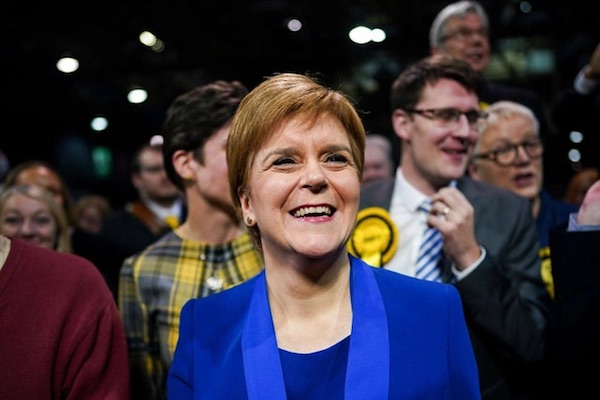
The Scottish National Party pulled off a resounding general election victory in the Westminster election on Thursday, pushing open the door to finally ending their union with England and staying within the EU.
Pro-independence nationalists took 48 seats out of a possible total of 59 Scottish constituencies, strengthening the SNP’s demands for a second independence referendum next year, and likely putting Scotland on a constitutional collision course with Johnson’s Conservative administration.
Nicola Sturgeon, SNP leader and Scotland’s first minister, who has now led her party to three consecutive British general election victories in Scotland, as well as victory in the 2016 Scottish Parliament election, stood on a platform of opposing Brexit and advocating a poll on Scotland’s right to choose its own constitutional future by 2020.
Sturgeon’s party gained 13 seats. She said the result represented a “renewed, refreshed and strengthened” mandate for a second vote on Scottish statehood.
The wave of SNP yellow which descended over the Scottish map in the early hours of Friday morning saw the Scottish leader of the Liberal Democrats, Jo Swinson, swept out of her own seat in the west of Scotland.
Ms Sturgeon said it had been an “exceptionally good night” for her party. She said she will write to the Prime Minister before Christmas to formally demand Holyrood be given the power to hold a second vote on independence.
While Mr Johnson has said he will block such a ballot, Ms Sturgeon said the Tories must “reflect very carefully” on the result of the election.
She said: “Scotland can’t be kept in the UK against its will. It can only do that by consent, therefore Scotland has to have the ability to decide that question.
“Then it is up to the people of Scotland what decision they make.”
But the party faces a difficulty if it is to hold an independence poll fully in accordance with British law. As far as London is concerned, the question of Scottish independence is a “reserved matter” for Westminster to decide.
Sturgeon has ruled out a Catalan-style independence referendum - which saw the Spanish region hold an unsanctioned plebiscite in October 2017 - but has not rejected the idea of the Scottish Parliament legislating for another vote. It is unclear if the Conservative government will attempt to fight the Scottish government in court over the question of whether the people of Scotland should have their say.
“There’s an English nationalism which has developed that is reactionary, pro-Brexit and which has retreated to the past,” said Simon Pia, a former Scottish Labour press adviser.
“Scottish nationalism is progressive - and looking to the future in a social democratic [manner] - whereas English nationalism has [fostered] resentment from Brexit. The two political cultures are very different.”
![[Irish Republican News]](https://republican-news.org/graphics/title_gifs/rn.gif)
![[Irish Republican News]](https://republican-news.org/graphics/title_gifs/harp.gif)

